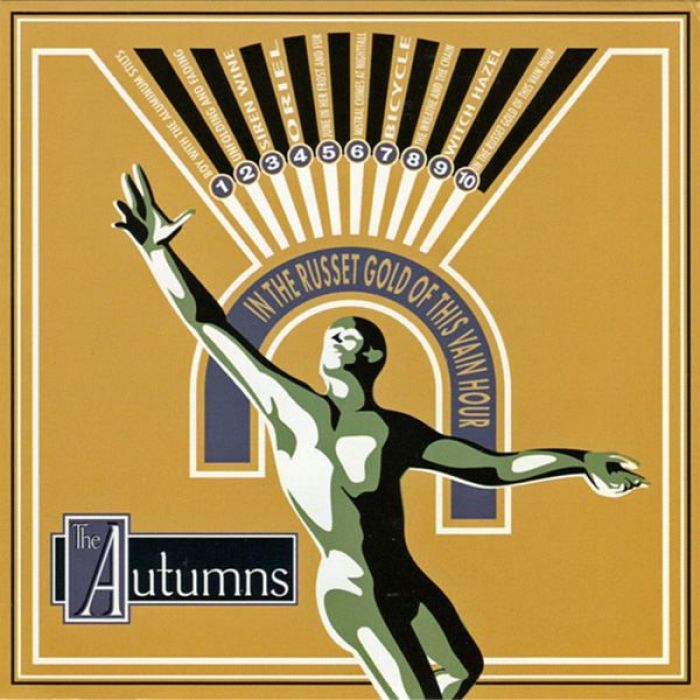In the Russet Gold of This Vain Hour by The Autumns (Review)

I call it the “Labradford Syndrome.” I come across a critically-acclaimed artist. Various newsgroups and mailing lists are full to the brim with adulation and praise. Everyone’s convinced that said artist is the “next big thing,” the artist “you need to check out,” the artist that “will change forever the way you look at music.” I go out and buy the CD, all pumped up with expectations, put the disc in, and… am disappointed. It’s not that the music is bad, but it’s certainly nowhere near as great as everyone thought it was. However, there’s that nagging doubt that maybe I missed something, that all of those people can’t be wrong. So I go out and pick up another CD by said artist, and suddenly, I see what everyone was talking about.
I call it the “Labradford Syndrome” because I first noticed it with everyone’s favorite trio of post-rockers. I picked up their debut, supposedly a stunning album of isolationist ambience. Instead, I got a CD full of boring drones and lo-fi noodling. However, I gave them another shot, and was subsequently blown away by their self-titled album, and then by Mi Media Naranja, and all of the praise and acclaim made sense.
Now this isn’t a review of Labradford, but of the Autumns’ latest, In the Russet Gold of This Vain Hour. I’ve known about this group for some time. I’d seen their name on the 4AD and Slowdive mailing lists, with everyone crowing about them and their take on ethereal rock. I read about their powerful vocals, their shimmering guitars, and their stunning cover of Slowdive’s “Blue Skied An’ Clear.” So I ordered a copy of The Angel Pool, popped it in expecting an incredible listening experience. Instead, I got a CD full of what sounded like power ballads for the shoegazer set. The CD had its moments, but they were drowned by the album’s sheer over-dramaticism.
Well, I’m here to tell you that In the Russet Gold of This Vain Hour is nothing like The Angel Pool. Well, that’s not entirely true. The elements are the same between the two albums; shimmering guitar textures, ghostly vocals that recall Thom Yorke’s finest moments, and a sense that the band’s ultimate wish was to be signed to 4AD or Slowdive-era Creation Records. But the difference is the way those elements are mixed and incorporated. In the Russet Gold of This Vain Hour lacks its predecessor’s sense of bombast, instead opting for a much more delicate sound, one of finesse and filigree. It certainly didn’t hurt that the album was produced by Simon Raymonde, who as a member of the Cocteau Twins, certainly knows a thing or two about creating beautiful, evocative pop music.
That, combined with the Autumn’s skillful sense of restraint, makes for an album that’s very pleasing to these ears. Little sonic delights pop up all over the place: chiming harmonics on “Unfolding And Fading” that recall The Cure’s “Disintegration”; the piping flutes on “June In Her Frost And Fur”; the gentle swell of guitars and strings that leads to “Bicycle“ ‘s climax; and the haunting tapestry of sparkling guitar notes and ghostly vocal tendrils that intertwine like strands of ivy in “Witch Hazel.” The vocals recall Liz Frazier’s angelic babbling, so it’s somewhat hard to make out what is being sung so beautifully. But I’m not certain I want to know; the vocals are so beautiful that I’m not sure any lyrics could do it (or the song titles, for that matter) justice.
I’ll admit that I probably wouldn’t have picked up this album if I hadn’t seen it for $3 in the used bin. But one person’s stupidity is my great gain. I’m incredibly glad I picked up In the Russet Gold of This Vain Hour. It seems odd to me that music like this is still coming out in 2000, because it sounds like it was channeled directly from the history of 4AD, when bands like the Cocteau Twins ruled the underground. But I’m not going to complain. Music this fragile and beautiful should not be subjected to questions like “How?” and “Why?” It should just simply be.